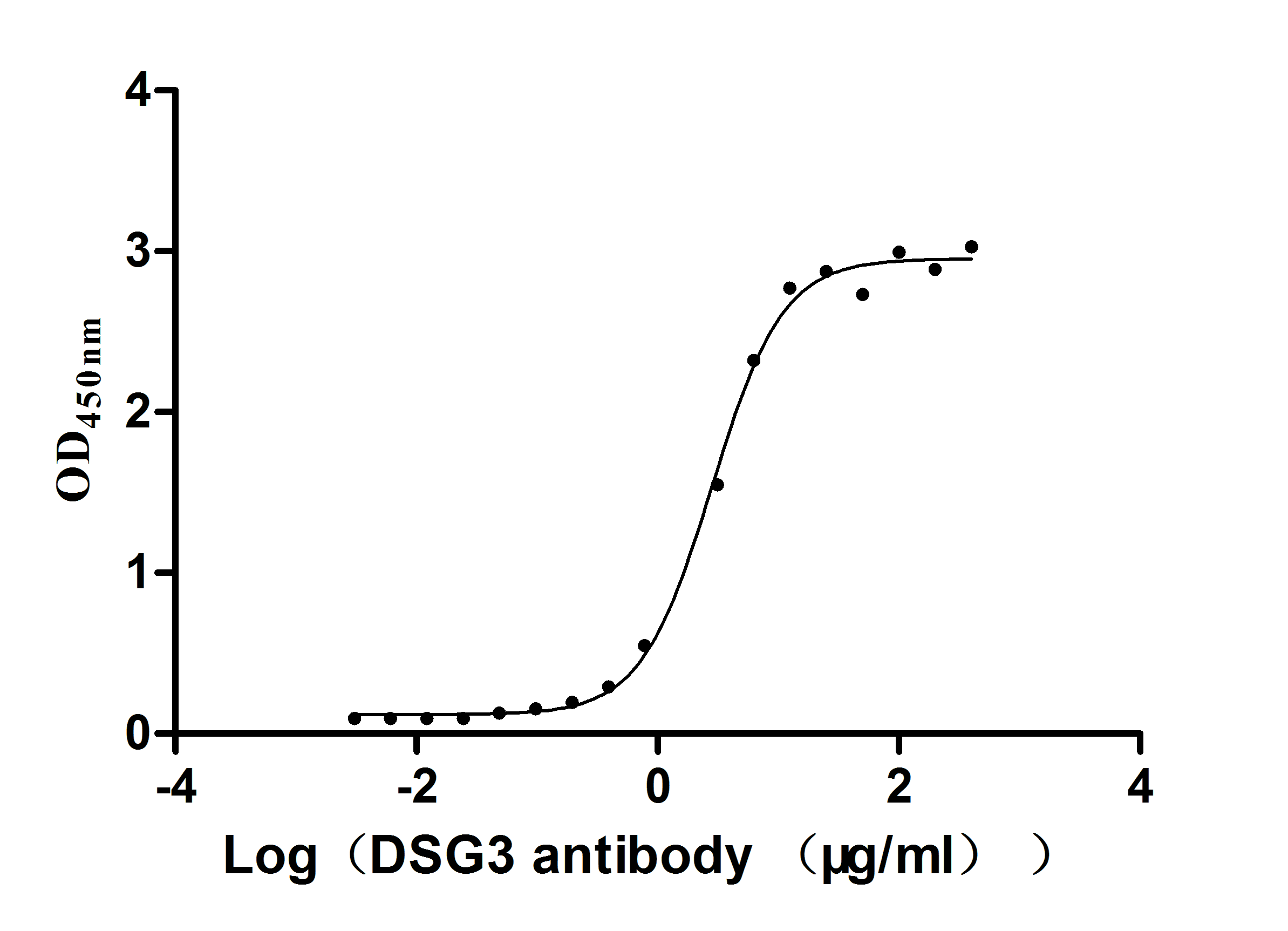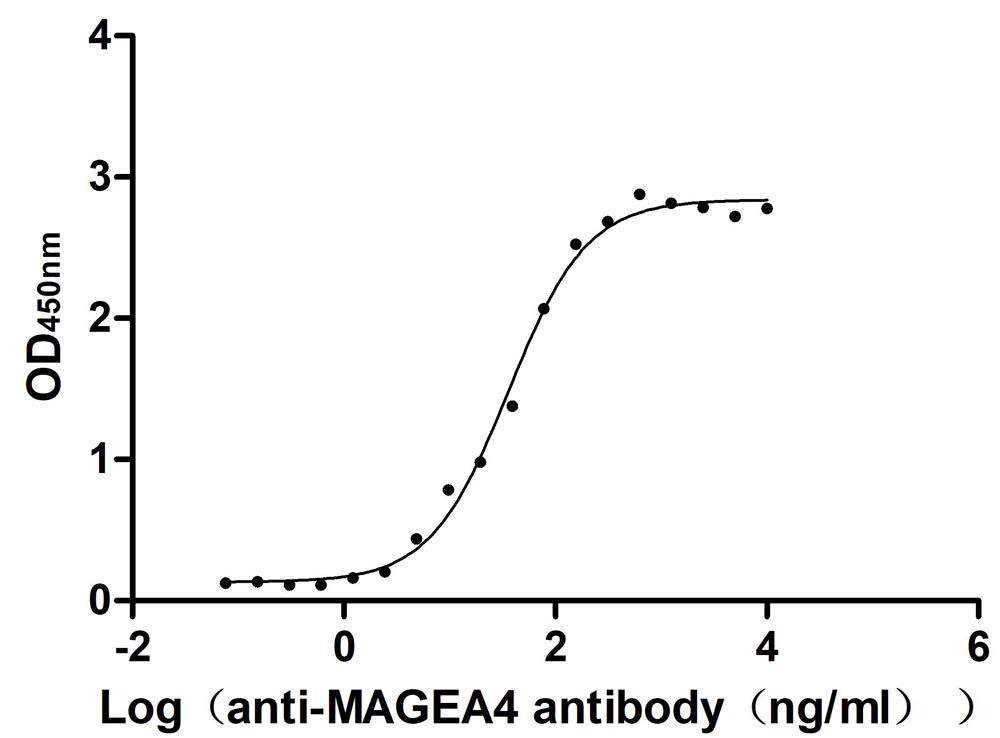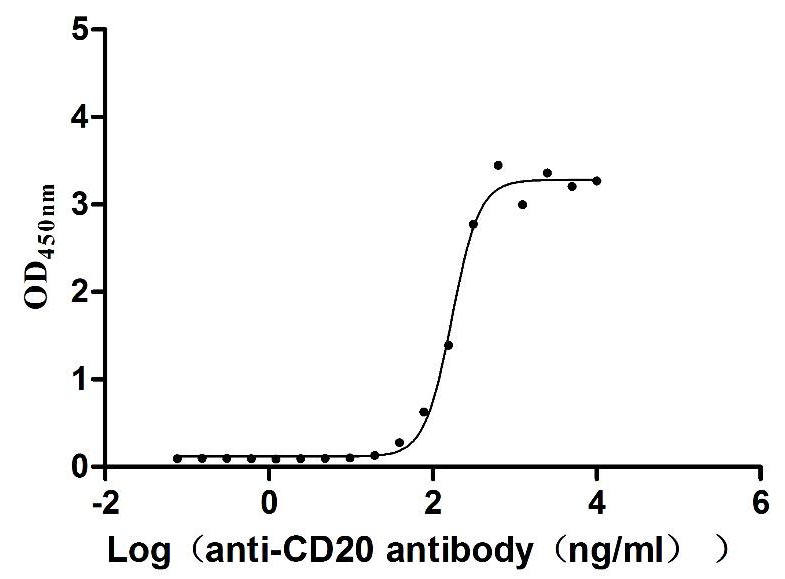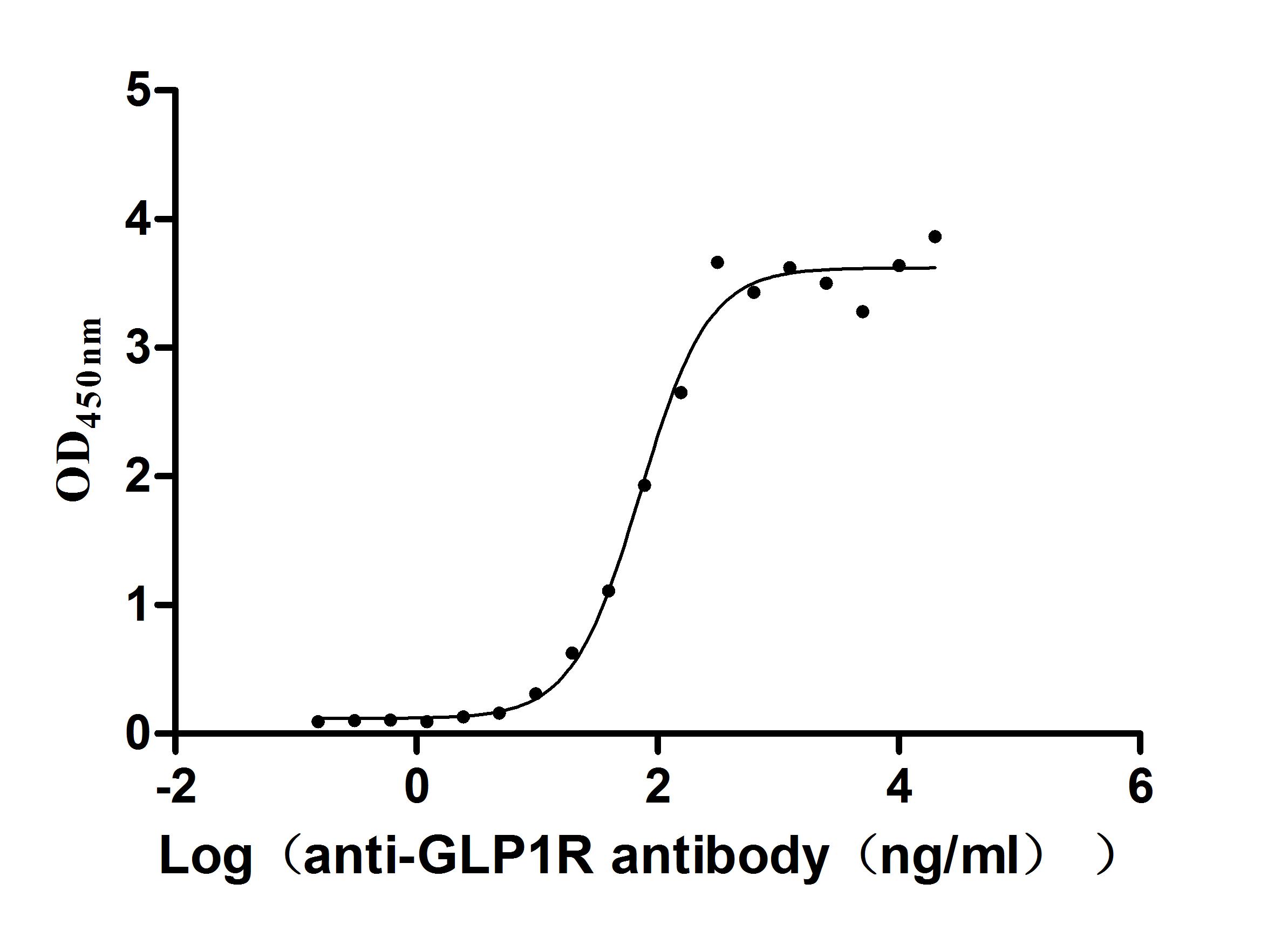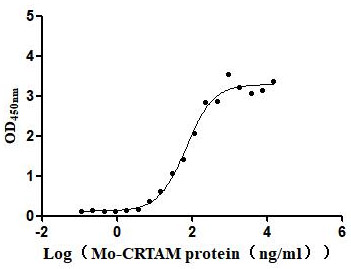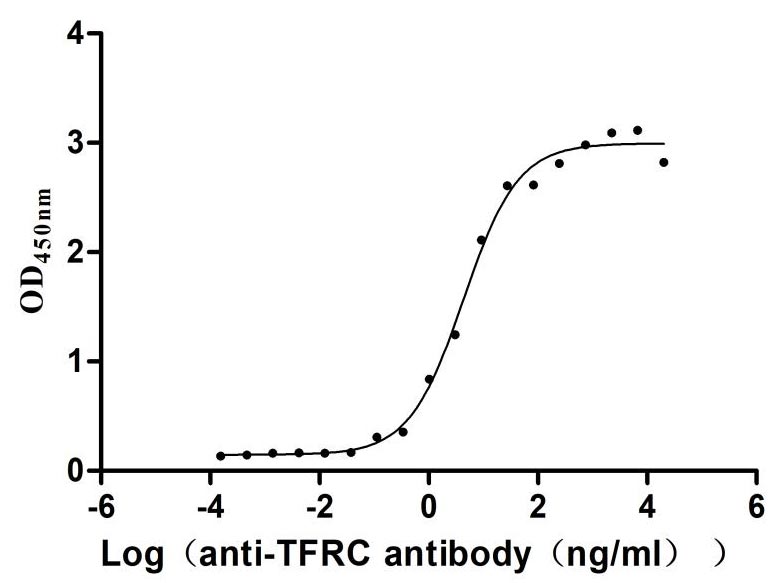Recombinant Human Tumor protein p73 (TP73)
-
货号:CSB-YP024092HU
-
规格:
-
来源:Yeast
-
其他:
-
货号:CSB-EP024092HU
-
规格:
-
来源:E.coli
-
其他:
-
货号:CSB-EP024092HU-B
-
规格:
-
来源:E.coli
-
共轭:Avi-tag Biotinylated
E. coli biotin ligase (BirA) is highly specific in covalently attaching biotin to the 15 amino acid AviTag peptide. This recombinant protein was biotinylated in vivo by AviTag-BirA technology, which method is BriA catalyzes amide linkage between the biotin and the specific lysine of the AviTag.
-
其他:
-
货号:CSB-BP024092HU
-
规格:
-
来源:Baculovirus
-
其他:
-
货号:CSB-MP024092HU
-
规格:
-
来源:Mammalian cell
-
其他:
产品详情
-
纯度:>85% (SDS-PAGE)
-
基因名:
-
Uniprot No.:
-
别名:p53 like transcription factor; p53 related protein; p53-like transcription factor; p53-related protein; p73; P73_HUMAN; TP73; Tumor protein p73
-
种属:Homo sapiens (Human)
-
蛋白长度:Full length protein
-
表达区域:1-636
-
氨基酸序列MAQSTATSPD GGTTFEHLWS SLEPDSTYFD LPQSSRGNNE VVGGTDSSMD VFHLEGMTTS VMAQFNLLSS TMDQMSSRAA SASPYTPEHA ASVPTHSPYA QPSSTFDTMS PAPVIPSNTD YPGPHHFEVT FQQSSTAKSA TWTYSPLLKK LYCQIAKTCP IQIKVSTPPP PGTAIRAMPV YKKAEHVTDV VKRCPNHELG RDFNEGQSAP ASHLIRVEGN NLSQYVDDPV TGRQSVVVPY EPPQVGTEFT TILYNFMCNS SCVGGMNRRP ILIIITLEMR DGQVLGRRSF EGRICACPGR DRKADEDHYR EQQALNESSA KNGAASKRAF KQSPPAVPAL GAGVKKRRHG DEDTYYLQVR GRENFEILMK LKESLELMEL VPQPLVDSYR QQQQLLQRPS HLQPPSYGPV LSPMNKVHGG MNKLPSVNQL VGQPPPHSSA ATPNLGPVGP GMLNNHGHAV PANGEMSSSH SAQSMVSGSH CTPPPPYHAD PSLVSFLTGL GCPNCIEYFT SQGLQSIYHL QNLTIEDLGA LKIPEQYRMT IWRGLQDLKQ GHDYSTAQQL LRSSNAATIS IGGSGELQRQ RVMEAVHFRV RHTITIPNRG GPGGGPDEWA DFGFDLPDCK ARKQPIKEEF TEAEIH
-
蛋白标签:Tag type will be determined during the manufacturing process.
The tag type will be determined during production process. If you have specified tag type, please tell us and we will develop the specified tag preferentially. -
产品提供形式:Lyophilized powder
Note: We will preferentially ship the format that we have in stock, however, if you have any special requirement for the format, please remark your requirement when placing the order, we will prepare according to your demand. -
复溶:We recommend that this vial be briefly centrifuged prior to opening to bring the contents to the bottom. Please reconstitute protein in deionized sterile water to a concentration of 0.1-1.0 mg/mL.We recommend to add 5-50% of glycerol (final concentration) and aliquot for long-term storage at -20℃/-80℃. Our default final concentration of glycerol is 50%. Customers could use it as reference.
-
储存条件:Store at -20°C/-80°C upon receipt, aliquoting is necessary for mutiple use. Avoid repeated freeze-thaw cycles.
-
保质期:The shelf life is related to many factors, storage state, buffer ingredients, storage temperature and the stability of the protein itself.
Generally, the shelf life of liquid form is 6 months at -20°C/-80°C. The shelf life of lyophilized form is 12 months at -20°C/-80°C. -
货期:Delivery time may differ from different purchasing way or location, please kindly consult your local distributors for specific delivery time.Note: All of our proteins are default shipped with normal blue ice packs, if you request to ship with dry ice, please communicate with us in advance and extra fees will be charged.
-
注意事项:Repeated freezing and thawing is not recommended. Store working aliquots at 4°C for up to one week.
-
Datasheet :Please contact us to get it.
相关产品
靶点详情
-
功能:Participates in the apoptotic response to DNA damage. Isoforms containing the transactivation domain are pro-apoptotic, isoforms lacking the domain are anti-apoptotic and block the function of p53 and transactivating p73 isoforms. May be a tumor suppressor protein.
-
基因功能参考文献:
- Data show that codon usage bias (CUB) was moderate in P73 gene and the percentage of mean C was the highest followed by G. The gene variants were GC rich. The GC-ending codons showed increasing usage with increasing GC3 while AT-ending codons showed the opposite with increasing GC3 bias. ATA and AGA were absent among the synonymous codons in P73 gene. Both mutation pressure and natural selection might influence the CUB. PMID: 30316927
- NQO1 is a FAD-dependent, two-domain multifunctional stress protein acting as a Phase II enzyme, activating cancer pro-drugs and stabilizing p53 and p73a oncosuppressors.tructural protein:protein interaction studies reveal that the cancer-associated polymorphism does not abolish the interaction with p73alpha, indicating that oncosuppressor destabilization largely mirrors the low intracellular stability of p.P187S. PMID: 28291250
- Tumor protein p73 (TAp73) and kallmann syndrome 1 sequence protein (KAI1) expression levels are positively correlated in colorectal cancer. PMID: 29222041
- the present study verified a novel molecular link between miRNA663b and TP73, and indicated that miRNA663b may be a critical therapeutic target in breast cancer. PMID: 29845295
- role of p73 in autophagy induction under nitrosative stress in K562 cells PMID: 29508625
- DeltaNp73 was abundantly expressed in the atopic dermatitis epidermis and increased the release of TSLP via NF-kappaB activation. PMID: 28655470
- PRIMA-1 could cause the demethylation of TP73, through DNMT1 depletion, to subsequently enhance the unfolded protein response PMID: 27533450
- Data found that P73 G4C14-to-A4T14 polymorphism was significantly associated with non-small cell lung cancer risk in Chinese population. PMID: 28415779
- DeltaNp73 had no leukemic transformation capacity by itself and apparently did not cooperate with the PML/RARA fusion protein to induce a leukemic phenotype in a murine BM transplantation model. PMID: 28035072
- In colorectal tumor cells RPL26 regulates p73 expression via two distinct mechanisms: protein stability and mRNA translation. PMID: 27825141
- p73 supports mitochondria respiration in medulloblastoma via regulation of glutamine metabolism PMID: 28971956
- Study suggests that the cleavage of p73 on specific sites may release its pro-apoptotic function and contribute to cell death in breast cancer. PMID: 26575022
- High TP73 expression is associated with glioblastoma cell invasion. PMID: 26930720
- In the present study, we provide evidence that the tumor suppressor gene p73 is highly susceptible to Mn-induced neurotoxicity in the nigrostriatal system. PMID: 27107493
- HECW2 is an ubiquitin ligase that stabilises p73, a crucial mediator of neurodevelopment and neurogenesis. This study implicates pathogenic genetic variants in HECW2 as potential causes of neurodevelopmental disorders in humans. PMID: 27389779
- Imbalance of the apoptosis pathway, with dysregulation of p73 and TRAIL, seems to play a role in the oncogenesis of odontogenic tumors PMID: 28025428
- High TP73 expression is associated with Metastasis of Hepatocellular Carcinoma. PMID: 28674078
- The reduction of tumor protein p63 and tumor protein p73 isoforms, rather than alteration of DeltaN isoform expression, exerted a significant functional repercussion on cell death and proliferation in hepatitis B virus -expressing HepB cells. PMID: 28350813
- p73 is epigenetically silenced in chondrosarcoma due to promoter methylation, which suggests the utility of p73 methylation as a biomarker. PMID: 28551631
- A considerable number of lymphoma patients lacked the expression of either or both isoforms, while all lymphoid leukemia patients expressed both isoforms. The expression pattern differences of p73 isoforms may reflect differences in the biology of these malignancies. PMID: 27103208
- TAp73beta upregulates pro-IL-1beta mRNA and processed IL-1beta protein. In addition, analysis of breast and lung cancer patient cohorts demonstrated that interaction between p73 and IL-1beta predicts a negative survival outcome in these cancers. PMID: 28212736
- analysis of how trifluoroethanol induces a conformational transition in the C-terminal sterile alpha motif (SAM) of human p73 PMID: 28235466
- The findings of this study suggested that the polymorphism G4C14-to-A4T14 in p73 gene might be associated with severe spermatogenesis impairment and could affect the susceptibility to male infertility with severe spermatogenesis impairment in Chinese population. PMID: 27525684
- s confirmed that miR-200a could directly bind to TP73-AS1 and the 3'UTR of HMGB1; TP73-AS1 competed with HMGB1 for miR-200a binding. PMID: 28403886
- The p73 gene may play a role as a tumor suppressor in the colorectal cancer progression. PMID: 27654017
- TP73 expression in cervical cancer was significantly higher than that in normal cervical squamous epithelium (meta-analysis) PMID: 28128397
- Expression of XAF1 and TAp73 was also upregulated in casticin-treated T24 cells. PMID: 27349281
- A p73-dependent mechanism for curcumin-induced apoptosis involves the mitochondria-mediated pathway. PMID: 26490992
- caveolin-1 represents one of the genes whose expression is strongly activated by Np73beta in non-small lung cancer cells PMID: 26337278
- Study shows that AR modulates the expression of both p21 and p73 via directly binding to the promoters, indicating that p73 and p21 are the downstream target genes of AR in triple-negative breast cancer cells. PMID: 26938985
- P73 is capable of inducing apoptosis by co-ordinately activating several BH3-only proteins, such as Bik. PMID: 26182360
- knockdown of p73 also decreases NAMPT inhibition-induced autophagy and cell death, whereas overexpression of p73 alone enhances these effects. PMID: 26586573
- data suggest that PCBP2 regulates p73 expression via mRNA stability and p73-dependent biological function in ROS production and cellular senescence. PMID: 26907686
- our study demonstrates a novel mechanism of PLK2 in promoting tumor progression, whereby it directly binds to enriched TAp73, catalyzes Ser48 phosphorylation of TAp73, and inhibits TAp73 transcriptional activity PMID: 26625870
- Meta-analysis results suggest that the p73 G4C14-A4T14 polymorphism is associated with an increased risk of cervical squamous cell carcinoma. PMID: 25516466
- Similar to TAp73, DNp73 is stabilized by hypoxia in a HIF-1a-dependent manner, which otherwise is degraded by Siah1. PMID: 26267146
- Data indicate tumor suppressors TP73, RASSF1A, MLH1 and BRCA1 as possible biomarkers to distinguish Pleomorphic invasive lobular cancer (pleomorphic ILC} from classic ILC and infiltrative ductal cancer (IDC). PMID: 26392358
- This review establishes the possibility that p73 is indeed capable of both promoting and inhibiting angiogenesis, depending on the cellular context. [review] PMID: 26711266
- Mechanistic investigations indicated that DNp73 acted by attenuating expression of miR-885-5p, a direct regulator of the IGF1 receptor (IGF1R) responsible for stemness marker expression. PMID: 26554827
- Tyrosine-99 phosphorylation determines the regulation of tumor suppressor p73. PMID: 25893286
- MDM2 mediates p73 ubiquitination PMID: 26025930
- s demonstrate that IGFBP3 is a direct TAp73alpha (the p73 isoform that contains the trans-activation domain) target gene and activates the expression of IGFBP3 in actively proliferating cells. PMID: 26063735
- TAp73 suppresses BNIP3 expression, directly binding its gene promoter. PMID: 25950386
- p73 overexpression and concomitantly decreased promoter methylation are significantly associated with poor survival in children with Wilm's tumor. PMID: 26184366
- Each nucleotide position in the response element has a different influence in determining the binding of the p73 DNA-binding domain. PMID: 26529454
- data support the hypothesis that the DeltaNp73/TAp73 ratio is an important determinant of clinical response in APL and may offer a therapeutic target for enhancing chemosensitivity in blast cells. PMID: 26429976
- this study shows that the p73 rs4648551 A>G polymorphism can be involved in the ovarian reserve. PMID: 25794170
- Hades (MUL1)-mediated p73 ubiquitination is a novel regulatory mechanism for the exonuclear function of p73. PMID: 26435500
- Overexpression of the Np73 isoform is associated with centrosome amplification in brain tumor. PMID: 25910708
- Restin inhibits epithelial-mesenchymal transition and tumor metastasis by controlling the expression of the tumor metastasis suppressor mir-200a/b via association with p73. PMID: 25972084
显示更多
收起更多
-
亚细胞定位:Nucleus. Cytoplasm. Note=Accumulates in the nucleus in response to DNA damage.
-
蛋白家族:P53 family
-
组织特异性:Expressed in striatal neurons of patients with Huntington disease (at protein level). Brain, kidney, placenta, colon, heart, liver, spleen, skeletal muscle, prostate, thymus and pancreas. Highly expressed in fetal tissue.
-
数据库链接:
HGNC: 12003
OMIM: 601990
KEGG: hsa:7161
STRING: 9606.ENSP00000367545
UniGene: Hs.192132
Most popular with customers
-
Recombinant Human Pro-neuregulin-1, membrane-bound isoform (NRG1), partial (Active)
Express system: Mammalian cell
Species: Homo sapiens (Human)
-
Recombinant Mouse Desmoglein-3 (Dsg3), partial (Active)
Express system: Mammalian cell
Species: Mus musculus (Mouse)
-
Recombinant Human IGF-like family receptor 1 (IGFLR1), partial (Active)
Express system: Mammalian cell
Species: Homo sapiens (Human)
-
Recombinant Human Melanoma-associated antigen 4 (MAGEA4) (Active)
Express system: Mammalian cell
Species: Homo sapiens (Human)
-
Recombinant Dog B-lymphocyte antigen CD20 (MS4A1)-VLPs (Active)
Express system: Mammalian cell
Species: Canis lupus familiaris (Dog) (Canis familiaris)
-
Recombinant Human Glucagon-like peptide 1 receptor (GLP1R), partial (Active)
Express system: Mammalian cell
Species: Homo sapiens (Human)
-
Recombinant Mouse Cell adhesion molecule 1 (Cadm1), partial (Active)
Express system: Mammalian cell
Species: Mus musculus (Mouse)
-
Recombinant Human Transferrin receptor protein 1 (TFRC), partial (Active)
Express system: Mammalian cell
Species: Homo sapiens (Human)


-AC1.jpg)
